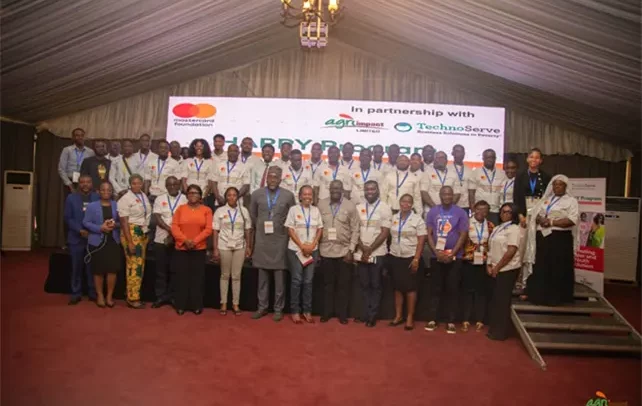Frank Obiara Mgbemena (middle) with the participants
The Harnessing Agricultural Productivity and Prosperity for Youth (HAPPY) Programme, led by TechnoServe in partnership with Agri-Impact Limited and the Mastercard Foundation, has convened key stakeholders in Kumasi for the 2025 Agri-SME & Finance Summit.
The summit brought together agribusinesses, financial institutions, equipment and technology providers, and development partners to explore ways of improving access to financing and equipment in Ghana’s agricultural sector, with a focus on youth and women-led enterprises.
According to TechnoServe’s Program Director, Frank Obiora Mgbemena, the summit was designed as a deal-making platform to connect 21 HAPPY-supported Agri-SMEs with banks, loan facilities, equipment suppliers, and other value chain actors.
“Nobody can drive transformational change alone—not the agribusinesses themselves nor the financial institutions. This platform enhances linkages among all players to leverage each other’s strengths,” Mr. Mgbemena stated.
The HAPPY Programme is a four-year initiative under the Mastercard Foundation’s Young Africa Works strategy, targeting the creation of 326,000 dignified jobs for young people across Ghana. It prioritises women and persons with disabilities and focuses on four key value chains: poultry, rice, soybean, and tomato.
At the summit, participants discussed strategies to increase access to finance, expand processing capacity, reduce post-harvest losses, and improve market linkages. The event also highlighted the importance of catalytic capital and micro-grants in equipping agribusinesses with tractors, harvesters, and working capital to scale operations.
Delivering the keynote address on the theme, “Powering Agribusiness Transformation in Ghana,” Agri-Impact CEO, Daniel Acquaye, challenged stakeholders to be bold in investing, changing policies, and scaling proven models.
“Agriculture remains the biggest absorber of labor, yet youth unemployment continues to rise. Transformation is not about marginal increments; it is about bold investments in infrastructure, markets, and policies that free agriculture to drive inclusive growth,” Mr. Acquaye emphasised.
He also called for the establishment of an “AgriFund” to mirror Ghana’s GETFund for education, urging policymakers to exempt agro-processors from withholding taxes on locally sourced raw materials to strengthen competitiveness.
The summit also featured testimonies from agribusiness beneficiaries. Ms. Zeinab Acheampong, team lead at Hakama Company Limited, a tomato processing business, praised the HAPPY Programme’s support in expanding operations.
“With catalytic funds and capacity support, we have been able to scale up our tomato processing and create jobs. This project is not only about funding but also about building systems to make businesses attractive to financial institutions,” she said.
Since its launch, the HAPPY Programme has supported 21 Agri-SMEs and over 228 microenterprises with capital, equipment, and enterprise training. According to organisers, the Kumasi summit is expected to generate concrete investment leads and strengthen market linkages for agribusiness growth across Ghana.
FROM David Afum, Kumasi


